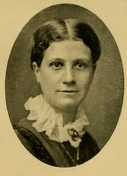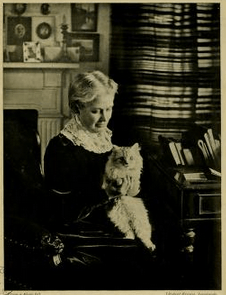Isabella Fyvie Mayo facts for kids
Isabella Fyvie Mayo (pen name, Edward Garrett; 10 December 1843 – 13 May 1914) was a Scottish writer. She wrote poems and novels. She also worked as a suffragist, fighting for women's right to vote.
Isabella Fyvie Mayo was known as a reformer. She was described as someone who believed in fairness for everyone. She was against war and unfair treatment of people. Her home was a safe place for people from India. She was also the first woman elected to a public board in Aberdeen, Scotland, where she lived most of her life.
Contents
Early Life and Learning
Isabella Fyvie was born in London, England, on December 10, 1843. Her parents, George Fyvie and Margaret Thomson, were from Scotland. As a child, Isabella loved listening to her father's stories. He told her old legends and tales from his family's farm in Scotland.
Her family had a long history in Scotland. Some of her relatives were important church leaders. Her mother's family also had interesting connections. They included Rev Alexander Hislop, who wrote a famous book, and Rev Stephen Hislop, a missionary and scientist in India.
Isabella was much younger than her brothers and sisters. She went to a day school and won many prizes for her studies. She was a very bright student.
Becoming a Writer
Isabella's journey into writing began with a relative. This relative was a student at King's College London. He saw how good her school essays and poems were. He suggested she try a career in writing.
For seven years, Isabella worked on her writing without getting paid. She kept going because she loved it. Her first big success came when her story, "Occupations of a Retired Life," was published. It appeared in The Sunday Magazine. This encouraged her to keep writing.
When she was only sixteen, Isabella started working to help her family with money problems. This experience helped her write books that could help others. Especially those who had doubts or worries. At 18, she met Anna Maria Hall, an Irish novelist. Anna Maria Hall gave her great encouragement and practical advice.
Life and Activism
In 1870, Isabella married John Ryall Mayo. He was a lawyer from London. John was not very healthy, so they traveled a lot. They even went to Canada. Later, they lived in Surrey, England. You can find hints of their travels in some of her stories.
In 1877, Isabella became a widow when her husband died. She was left with one son. The next year, she moved from London to Aberdeen, Scotland. She found London too difficult after her husband's death. Her health improved after moving to Aberdeen.
In Aberdeen, Isabella became very active in the women's suffrage movement. This movement fought for women's right to vote. She saw differences between the older groups, like the National Union of Women's Suffrage Societies, and the more active groups, like the Women's Social and Political Union (WSPU). She also noticed that local activists were often linked to political parties.
Isabella was a leader for local WSPU events. She talked with famous suffragists like Emmeline Pankhurst and Helen Fraser. She also wrote in local newspapers, debating with people who were against women voting. Some of her letters about women's suffrage are kept at the University of Aberdeen. She was even suggested for a special memorial plaque in Aberdeen.
Isabella preferred to be called Isabella Fyvie Mayo. She did not like using "Mrs." or her husband's name, which was common then. However, she is best known by her pen name, Edward Garrett. She used this name in many popular magazines. These included The Sunday Magazine, Good Words, The Quiver, Sunday at Home, and The Girl's Own Paper.
Personal Life and Beliefs
Isabella Fyvie Mayo strongly supported women's right to vote. She spoke out for this cause. Her ideas about the campaign changed over the years. Her writings showed and also questioned the changes in the movement. She often pointed out that middle-class activists sometimes made choices that poorer women could not afford.
Some research suggests she might have talked with Mahatma Gandhi. She wrote to him about how the women's movement was trying to achieve its goals. George Ferdinands, a man from Sri Lanka, lived with Isabella in her Scottish home. She thought of him as an adopted son.
Isabella Fyvie Mayo passed away on May 13, 1914, from cancer. She left her property to George Ferdinands.
Writing Style and Topics
Isabella Fyvie Mayo, writing as Edward Garrett, was known for her charming and natural stories. Her tales showed that she cared about many different people and issues. Her stories were powerful and accurate.
Her poems, especially her ballads, were simple and had a special rhythm. She also wrote sonnets, which are a type of poem with a specific structure. All her writings were clear in thought. They also showed deep imagination and a beautiful artistic style.
Selected Works
- Occupations of a Retired Life (1868)
- The Crust of the Cake (1869)
- Seen and Heard (1871)
- Premiums paid to Experience (1872)
- Crooked Places (1873)
- By Still Waters (1874)
- Doing and Dreaming (1876)
- Not by Bread Alone (1890)
- Her Day of Service (1892)
- A Black Diamond (1893)
- Rab Bethuene's Double (1894)
- A Daughter of the Klephts (1897)
- A Nine Days Wonder (1898)
- Other People's Stairs (1898)
- Crystal Joyce (1899)
- Recollections of Fifty Years, autobiography (1910)



